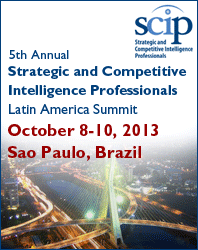 |
||||
|
||||
|
SCIP CIP™ CERTIFICATION Is a Is a "Googlized" Workplace Replacing Dedicated Competitive Intelligence Resources?
The answer is very clear: yes. One indicator is the number of members in the SCIP LinkedIn group, which is a magnitude larger than actual membership in SCIP. However, behavioral research suggests that two groups will be the last to see or admit to this reality: competitive intelligence professionals and the vendors who sell them services. The reason follows the Prospect Theory’s famous finding that those who face a loss fight harder than those who face a gain (see the bibliography for Ch. 4 at the end of my book, Business Blindspots). The title of this piece is taken from a recent discussion on SCIP LinkedIn. It was posted by Tim Powell, a SCIP Fellow who evoked the analogy of the word processing specialists who were replaced by the personal computer and then asked: Is CI still a discrete specialty, or have many of its tools and techniques been absorbed into other corporate functions (for example, strategy and sales)? If the former, how has the role of CI evolved?As one can expect, the emotional outpouring from CI professionals and their suppliers was fast and furious claiming the dedicated CI professional is even more important with the easier access to search by less skilled managers. That is of course what Kahneman calls “substituting the question” for an easier one. The question wasn’t “is it the right thing for companies to do” but “is it happening?” And the answer is still yes. There are two things wrong with this defensive posturing. First, it assumes that the vendors and consultants who provide their CI managers clients with arguments for why CI is “more important today than ever” will go down with their loved ones like Leonardo DiCaprio in the Titanic. They won’t. The vendors, consulting companies and other service providers will switch in a blink of an eye to selling direct to brand managers, marketing managers, development managers, and other functionaries. Sure, it is more convenient and cheaper to have one contact person to deal with, especially if that person keeps buying from the same loving vendor year after year. But that’s about it. Actually, as this “Googlized” workplace trend continues, big vendors will offer companies to outsource their competitive research all together, just as IMS has done in Pharma. Smaller vendors will just disappear. Second, and more insidious, the blindsided practitioners—who still have their jobs(for now) and deny the possibility that the company will decide(outrageously) to save a buck by doing away with the dedicated resource in exchange for decentralized secondary searches by managers—do not realize that they brought it on themselves by having no professional designation or certified training, and no recognizable expertise beyond search for information. If management believes that the CI function is about collection, then decentralizing it during the age of the RSS feed and popular automated search software is a very rational decision. The root of all problems might well be the CI professionals who do not yet realize what their “special skill” or expertise is. They think it is in collection or search skills. There are those who claim there is even an intuitive element to seasoned professionals that separates the successful ones from the rest (and surely from the amateur “Googelized” user). This is probably true and completely irrelevant. First, it is far from clear how crucial this bit of hard-to-get information is to companies. Second, in his book, Thinking, Fast and Slow (2012, Chapter 22), Noble Prize winner Daniel Kahneman provides clear and loud debunking to the myth that “intuition” is a mysterious quality reserved for special people. Intuition operates only in an environment that is sufficiently regular and predictable. That is why experienced researchers who have had many opportunities to observe the regular patterns in successful searches appear to be more skilled than novices. By implication, however, the most successful researchers with this “sixth sense” will be people working for… the large research vendors, simply because they have had the opportunity to engage in many more searches. So if this is what the CI professional relies on, he or she can be replaced by the “Googlized”/decentralized workplace, and the occasional direct contracts to vendors. The main task of competitive intelligence, which is to develop an insight — a deeper understanding than most — into the forces in one’s competitive landscape, is hardly an intuitive skill. The competitive environment is neither highly predictable nor repeated regularly. That is why there is no role for a “sixth sense” or “gut feeling” in insightful analysis, and no advantage to vendors or consultants from repeated experiences. Sure, some people will be better at reaching insights than others, as in any task. But Insight does not relate to experience but to perspective, which in turn relies on training in intelligence frameworks. Most importantly for companies, insight is based on conversion of data points, and therefore is less subjected to a decentralized, “Googlized,” workforce (though not totally immunized). Competitive intelligence professionals and their advisors might profit by understanding this distinction. About the Author Ben Gilad is the author of seven books, among them Business War Games (Career press, 2009), Early Warning (AMACOM, 2004), and Business Blindspots (Irwin, 1994). He is the President and co-founder of the Fuld-Gilad-Herring Academy of Competitive intelligence (www.academyci.com). In his past he was a great strategy professor (Rutgers U), a lousy junior police intelligence officer (Israel), and an old fashioned, free market economist (Ph.D. 1981, NYU). He still misses his undergrad classes at Rutgers who believed every word he said. He does not miss the MBA classes, though. He lives with his family in Boca Raton, FL where he is the only one on his block who does not drive a Mercedes. He also holds SCIP Meritorious award from 1996. Since 1991, Ben has been running war games for the Fortunate 500 in 5 continents and every imaginable industry (for more boring info go to www.bengilad.com). |








